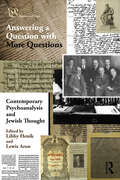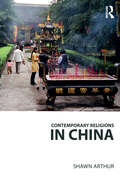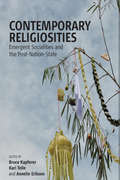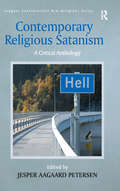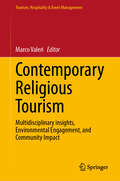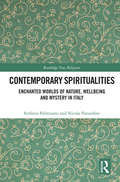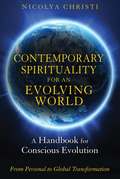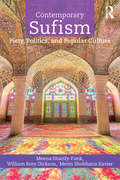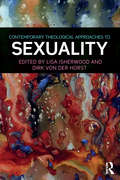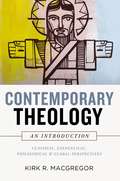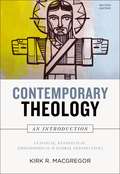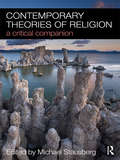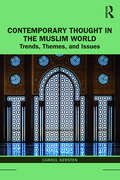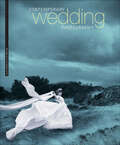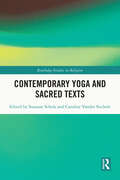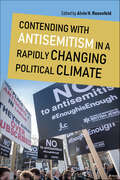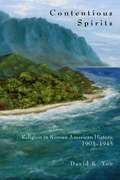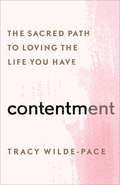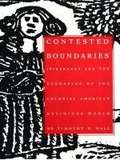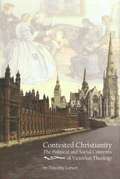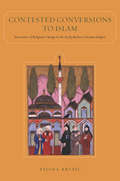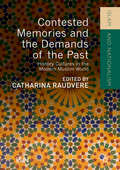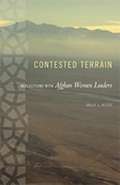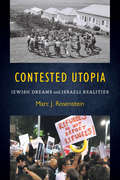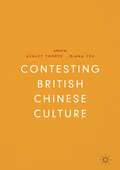- Table View
- List View
Contemporary Psychoanalysis and Jewish Thought: Answering a Question with More Questions (Psyche and Soul)
by Lewis Aron Libby HenikDemonstrating the connections between contemporary psychoanalysis, Jewish thought and Jewish history, this volume is a significant contribution to the traditions of dialogue, debate and change-within-continuity that epitomize these disciplines. The authors of this volume explore the cross-disciplinary connections between psychoanalysis and Jewish thought, while seeking out the resonance of new meanings, to exemplify the uncanny similarities that exist between ancient Rabbinic methods of interpretation and contemporary psychoanalytic theory and methodology, particularly the centrality of the question and the deconstruction of narrative. In doing so, this collaboration addresses the bi-directional influence between, and the relevance of, the Jewish interpretive tradition and psychoanalysis to provide readers with renewed insight into key topics such as Biblical text and midrash, religious traditions, trauma, gender, history, clinical work and the legacies of the Holocaust on psychoanalytic theory. Creating an intimate environment for interdisciplinary dialogue, this is an essential book for students, scholars and clinicians alike, who seek to understand the continued significance of the multiple connections between psychoanalysis and Jewish thought.
Contemporary Religions in China (Religions in Focus)
by Shawn ArthurFolk and popular religion is a very significant part of Chinese religious life, especially in rural areas. Contemporary Religions in China focuses on the religious activities of the lay people of contemporary China and their ideas of what it means to be "religious" and to practice "religion". Throughout, the discussion is illustrated with case studies, textboxes, images, thought questions, and further reading, which help to capture what religion is like, how and why it is practiced, and what ‘religion’ means for everyday people across China in the twenty-first century. Contemporary Religions in China is an ideal introduction to religion in China for undergraduate students of religion, Chinese studies, and anthropology.
Contemporary Religiosities
by Bruce Kapferer Annelin Eriksen Kari TelleThe last decade has seen an unexpected return of the religious, and with it the creation of new kinds of social forms alongside new fusions of political and religious realms that high modernity kept distinct. For a fuller understanding of what this means for society in the context of globalization, it is necessary to rethink the relationship between the religious and the secular; the contributors - all leading scholars in anthropology - do just that, some even arguing that secularization itself now takes a religious form. Combining theoretical reflection with vivid ethnographic explorations, this essential collection is designed to advance a critical understanding of social and personal religious experience in today's world.
Contemporary Religious Satanism: A Critical Anthology (Routledge New Religions)
by Jesper Aagaard PetersenThe Church of Satan was founded by Anton LaVey on April 30, 1966. In his hands, Satan became a provocative symbol for indulgence, vital existence, natural wisdom and the human being's true animal nature. At present, religious Satanism exists primarily as a decentralized subculture with a strong internet presence within a larger Satanic milieu in Western culture. Though most are inspired by LaVey, the majority of contemporary Satanists are not members of the Church of Satan. The various expressions of modern Satanism all navigate in today's detraditionalized religious market through the creative appropriation of popular culture, philosophy, literature and religion. The concrete solutions are varied; but they all understand the power of transgression allying oneself with a most powerful symbol of resistance, namely Satan. Thus, contemporary religious Satanism could be understood as a complex negotiation of atheism, secularism, esotericism and self: A "self-religion" in the modern age. Despite the fascinating nature of religious Satanism, it has attracted little scholarship until relatively recently. This book brings together a group of international scholars to produce the first serious book-length study of religious Satanism, presenting a collection that will have wide appeal to specialists and non-specialists alike. The first part contains broader studies of influential groups and important aspects of the Satanic milieu, especially regarding historical developments, the construction of tradition and issues of legitimacy. The second part narrows the view to regional variations, especially with studies on Northern and Eastern Europe. The third part consists of primary documents selected for their representational and informational value.
Contemporary Religious Tourism: Multidisciplinary insights, Environmental Engagement, and Community Impact (Tourism, Hospitality & Event Management)
by Marco ValeriThis book explores the multifaceted impact of religious tourism on prominent global destinations, addressing significant research gaps in this evolving field. Religious tourism, driven by complex psychosocial motives, particularly religious and spiritual needs, has long influenced travel behavior. Pilgrimages, a key aspect of religious tourism, are examined in depth, highlighting their role in fulfilling spiritual and material needs across various belief systems. The book investigates the intricate relationship between religion and tourism, considering factors such as authenticity, emotional solidarity, pro-environmental behaviors, and the educational aspects of spiritual journeys. With case studies from diverse regions such as Greece, India, Italy, and Bulgaria, the book offers a global perspective on how religious tourism intersects with marketing, economics, social development, and sustainability. This volume provides valuable insights for academics, practitioners, and policymakers interested in the profound and diverse implications of religious tourism in different cultural and geographical contexts.
Contemporary Spiritualities: Enchanted Worlds of Nature, Wellbeing and Mystery in Italy (Routledge New Religions)
by Stefania Palmisano Nicola PannofinoContemporary alternative spirituality, as studied by sociologists, is usually seen as a recent phenomenon dating from the 1960s and 1970s. However, when viewed from a longer-term perspective this form of religious expression is actually seen to reintroduce concepts that recur throughout Western cultural history. This book argues, therefore, that spirituality in the 21st Century actually shares many of the same characteristics as Classical, Mediaeval, Renaissance and Modern spiritualities. It is neither entirely new, nor is it clearly alternative to more established religions. The book is divided into two parts. The first sets out the context in which contemporary alternative spirituality has formed, charting its development as an academic term and a social phenomenon. The second part looks at how these two elements have developed in countries that are historically Catholic, focussing on specific examples in contemporary Italy: spiritualities based on the sacralisation of nature; those concerned with health and wellbeing; and those which are fascinated by mystery.Catholic majority countries are particularly interesting in this instance, as the Catholic Church has a unique cultural hegemony with which to compare alternative spiritual practices. It concludes that spirituality, if framed in a longer historical perspective, is a way of acting and seeing the world which was built, and continues to be built upon complex relations with various contradictory sources of authority, such as religion, magic thinking, secularism, rationalism, various spheres of lay culture. This is a bold take on the spirituality milieu and as such will be of great interest to scholars of Religious Studies working on the sociology of religion, contemporary spirituality and the rise of the "spiritual but not religious".
Contemporary Spirituality for an Evolving World: A Handbook for Conscious Evolution
by Nicolya ChristiA practical guide to conscious evolution for personal, spiritual, and global transformation • Provides spiritual practices to manifest a meaningful connection between Self and God/Source/Creator and psychological exercises to heal the shadow self • Offers an in-depth overview of religion and spirituality, both the old paradigm and the evolving new one • Includes the first fully written account of the First Nations Peoples’ oral wisdom teachings on the 7 Dark, 7 Light, and 7 Rainbow Arrows for evolving consciousness We are living in an unprecedented time of change, a new epoch with a new consciousness. We have reached Zero Point in our personal and collective consciousness and are now in a phase of accelerated conscious evolution and manifestation of personal and collective vision. As the current political, economic, and social systems begin to collapse, people are instinctively and intuitively reevaluating their lives and asking what has real meaning and value and what brings them true peace and happiness. Humanity is now poised to establish a unified, co-creative new world that reflects the evolved consciousness of awakened hearts and minds, of collaboration, and of peace. Presenting a guide for these auspicious times, Nicolya Christi offers psychological and spiritual tools to accelerate conscious and global evolution and initiate a New Consciousness for the post–December 21st, 2012, epoch. She gives an in-depth overview of religion and spirituality, both the old paradigm and the evolving new one, and explains how all trauma results from “empathic disconnection,” which hinders our spiritual growth. She provides spiritual practices to manifest a meaningful connection between Self and God/Source/Creator as well as psychological exercises to heal and integrate the shadow self and dissolve psychological wounds. She offers the first fully written account of the First Nations Peoples’ oral wisdom teachings on the 7 Dark, 7 Light, and 7 Rainbow Arrows for evolving consciousness. She also writes in depth about the evolution of relationship and aspiring to a higher love and sexuality. Detailing several maps and models for conscious and global evolution, this handbook inspires each of us toward a consciously evolving spirituality and a true and authentic relationship with God/Source/Creator.
Contemporary Sufism: Piety, Politics, and Popular Culture (Islam Of The Global West Ser.)
by Meena Sharify-Funk William Rory Dickson Merin Shobhana XavierWhat is Sufism? Contemporary views vary tremendously, even among Sufis themselves. Contemporary Sufism: Piety, Politics, and Popular Culture brings to light the religious frameworks that shape the views of Sufism’s friends, adversaries, admirers, and detractors and, in the process, helps readers better understand the diversity of contemporary Sufism, the pressures and cultural openings to which it responds, and the many divergent opinions about contemporary Sufism’s relationship to Islam. The three main themes: piety, politics, and popular culture are explored in relation to the Islamic and Western contexts that shape them, as well as to the historical conditions that frame contemporary debates. This book is split into three parts: • Sufism and anti-Sufism in contemporary contexts; • Contemporary Sufism in the West: Poetic influences and popular manifestations; • Gendering Sufism: Tradition and transformation. This book will fascinate anyone interested in the challenges of contemporary Sufism as well as its relationship to Islam, gender, and the West. It offers an ideal starting point from which undergraduate and postgraduate students, teachers and lecturers can explore Sufism today.
Contemporary Theological Approaches to Sexuality
by Lisa Isherwood and Dirk von der HorstContemporary Theological Approaches to Sexuality provides a much-needed overview of the state of scholarship on Christian theological reflection on sexuality and sexual theology. Critically, it also intervenes in the cultural debate over sexuality by privileging feminist, queer, and other counter-normative perspectives. Comprising twenty-three chapters by a team of international contributors this volume is divided into four parts: • Normativity and transgression • Bodies • Economies and violence • Divinity. Within these sections central issues, debates and problems are examined, including consideration of the complexities of Christian theology in regard to contemporary sexuality debates. Contemporary Theological Approaches to Sexuality is essential reading for students and researchers in the field of religion, sexuality, and Christianity.
Contemporary Theology: Classical, Evangelical, Philosophical, and Global Perspectives
by Kirk R. MacGregorAccessible and comprehensive, Contemporary Theology: An Introduction by professor and author Kirk R. MacGregor provides a chronological survey of the major thinkers and schools of thought in modern theology in a manner that is both approachable and intriguing.Unique among introductions to contemporary theology, MacGregor includes:Evangelical perspectives alongside mainline and liberal developmentsThe influence of philosophy and the recent Christian philosophical renaissance on theologyGlobal contributionsRecent developments in exegetical theologyThe implications of theological shifts on ethics and church lifeContemporary Theology: An Introduction is noteworthy for making complex thought understandable and for tracing the landscape of modern theology in a well-organized and easy-to-follow manner.
Contemporary Theology: Classical, Evangelical, Philosophical, and Global Perspectives
by Kirk R. MacGregorAccessible and comprehensive, Contemporary Theology: An Introduction by professor and author Kirk R. MacGregor provides a chronological survey of the major thinkers and schools of thought in modern theology in a manner that is both approachable and intriguing.Unique among introductions to contemporary theology, MacGregor includes:Evangelical perspectives alongside mainline and liberal developmentsThe influence of philosophy and the recent Christian philosophical renaissance on theologyGlobal contributionsRecent developments in exegetical theologyThe implications of theological shifts on ethics and church lifeContemporary Theology: An Introduction is noteworthy for making complex thought understandable and for tracing the landscape of modern theology in a well-organized and easy-to-follow manner.
Contemporary Theories of Religion: A Critical Companion
by Michael StausbergInterest in theories of religion has never been greater. Scholars debate single theoretical approaches in different scholarly journals, while the ‘new atheists’ such as Richard Dawkins and Daniel Dennett criticize the whole idea of religion. For everyone eager to understand the current state of the field, Contemporary Theories of Religion surveys the neglected landscape in its totality. Michael Stausberg brings together leading scholars of the field to review and discuss seventeen contemporary theories of religion. As well as scholars of religion, it features anthropologists, archaeologists, classicists, evolutionary biologists, philosophers and sociologists. Each chapter provides students with background information on the theoretician, a presentation of the theory’s basic principles, an analysis of basic assumptions, and a review of previous critiques. Concluding with a section entitled 'Back and Forth', Stausberg compares the different theories and points to further avenues of discussion for the future.
Contemporary Thought in the Muslim World: Trends, Themes, and Issues (Contemporary Thought in the Islamic World)
by Carool KerstenThis book presents an intellectual history of today’s Muslim world, surveying contemporary Muslim thinking in its various manifestations, addressing a variety of themes that impact on the lives of present-day Muslims. Focusing on the period from roughly the late 1960s to the first decade of the twenty-first century, the book is global in its approach and offers an overview of different strands of thought and trends in the development of new ideas, distinguishing between traditional, reactionary, and progressive approaches. It presents a variety of themes and issues including: The continuing relevance of the legacy of traditional Islamic learning as well as the use of reason; the centrality of the Qur’an; the spiritual concerns of contemporary Muslims; political thought regarding secularity, statehood, and governance; legal and ethical debates; related current issues like human rights, gender equality, and religious plurality; as well as globalization, ecology and the environment, bioethics, and life sciences. An alternative account of Islam and the Muslim world today, counterbalancing narratives that emphasise politics and confrontations with the West, this book is an essential resource for students and scholars of Islam.
Contemporary Wedding Photography
by Julie Oswin Steve WaltonWedding photography has become about story-telling-capturing the emotions and atmosphere of the day through reportage-style photography. This user-friendly manual reveals the techniques needed to create this contemporary style, for professional photographers looking to update their methods, or for aspiring photographers wanting to break into this lucrative market.Includes all the advice you need, from preparation and planning before the wedding, to digital manipulation of your images and presentation to the couple.Features comprehensive checklists, professional tips, tried-and-tested templates, advice boxes and step-by-step sequences to provide endless inspiration and guarantee successful shooting.Demonstrates the fresh contemporary style preferred by modern couples.
Contemporary Yoga and Sacred Texts (Routledge Studies in Religion)
by Caroline Vander SticheleThis book explores the textual traditions that authorize the history, legitimacy, and authenticity of today’s physical posture practice. The volume focuses on why and how yoga communities have adopted various texts that they consider sacred or spiritually meaningful. Among the texts discussed are Yogananda‘s Autobiography, Sri Aurobindo's Savitri, Patanjali’s Yoga Sutra, the Bhagavad Gita, the Hatha Yoga Pradipika, the Upanishads, the Vedas, and the Yoginī Tantra. Famous thinkers included are Aurobindo, Yogananda, Osho-Rajneesh, Sogyal Rimpoche, Charles Johnston, and Howard Thurman. Offering a starting point, the ten chapters address the nature, selection, and function of various ancient and contemporary texts read in contemporary yoga settings. The attention centers on how and why texts are read and for whom they are read. As yoga is practiced in ashrams, yoga studios, gyms, meeting rooms, and even private living rooms, scholarly approaches to investigate the connections between yoga and texts are necessarily diverse.This volume aims to inspire further scholarship on the reading of texts in past and present yoga communities. The collection demonstrates that textual tradions deserve to be an important part of contemporary yoga scholarship. The volume will, therefore, be of great interest to scholars of religious studies, yoga studies, and Asian studies, as well as those studying sacred texts.
Contending with Antisemitism in a Rapidly Changing Political Climate (Studies in Antisemitism)
by Alvin H. RosenfeldToday's highly fraught historical moment brings a resurgence of antisemitism. Antisemitic incidents of all kinds are on the rise across the world, including hate speech, the spread of neo-Nazi graffiti and other forms of verbal and written threats, the defacement of synagogues and Jewish cemeteries, and acts of murderous terror. Contending with Antisemitism in a Rapidly Changing Political Climate is an edited collection of 18 essays that address antisemitism in its new and resurgent forms. Against a backdrop of concerning political developments such as rising nationalism and illiberalism on the right, new forms of intolerance and anti-liberal movements on the left, and militant deeds and demands by Islamic extremists, the contributors to this timely and necessary volume seek to better understand and effectively contend with today's antisemitism.
Contentious Spirits: Religion in Korean American History, 1903-1945
by David YooThis is the first book-length study of religion in the early history of Korean immigrants and their descendants in the United States. Yoo (history, Claremont McKenna College) focuses on the Protestant experience in the greater Honolulu and Los Angeles areas for the period 1903 to 1945. He builds his analysis on the themes of religion and the racialization of Koreans in the US, the impact of religion on networks of migration and exile, and issues of colonialism and independence in Korea and the US. Annotation ©2010 Book News, Inc. , Portland, OR (booknews. com)
Contentment: The Sacred Path to Loving the Life You Have
by Tracy Wilde-PaceFrom a fifth-generation preacher and pastor and acclaimed author of Finding The Lost Art of Empathy comes a moving and inspirational exploration of the true meaning of contentment and how we can incorporate it into our lives.Through her own personal experiences and years of focused Bible study, Tracy Wilde investigates one of the greatest mysteries of modern Christian life: contentment. She reveals that contentment differs from happiness, and is not something you can implement in a day—it takes time, practice, and an awareness of the draining distractions that rob us of joy, satisfaction, gratitude, and trust. In this book, Tracy explores the life of Paul the Apostle to show how we can live a life of fulfillment no matter the circumstances. Using the Biblical book of Philippians, Tracy presents contentment as a crucial practice for all followers of Jesus. She distinguishes the differences between happiness (shallow and short term) and contentment (deep and lasting), examines our tendency toward entitlement, and acknowledges the fear and anxiety when life gets tough. With her lyrical prose, profound insight, and &“heart for people&” (Lisa Bevere, New York Times bestselling author), Tracy offers encouragement and confidence as she helps you learn the secret of contentment and helps you focus on all that is good and true and beautiful so you can see your life anew.
Contested Boundaries: Itinerancy and the Reshaping of the Colonial American Religious World
by Timothy D. HallThe First Great Awakening in eighteenth-century America challenged the institutional structures and raised the consciousness of colonial Americans. These revivals gave rise to the practice of itinerancy in which ministers and laypeople left their own communities to preach across the countryside. In Contested Boundaries, Timothy D. Hall argues that the Awakening was largely defined by the ensuing debate over itinerancy. Drawing on recent scholarship in cultural and social anthropology, cultural studies, and eighteenth-century religion, he reveals at the center of this debate the itinerant preacher as a catalyst for dramatic change in the religious practice and social order of the New World.This book expands our understanding of evangelical itinerancy in the 1740s by viewing it within the context of Britain's expanding commercial empire. As pro- and anti-revivalists tried to shape a burgeoning transatlantic consumer society, the itinerancy of the Great Awakening appears here as a forceful challenge to contemporary assumptions about the place of individuals within their social world and the role of educated leaders as regulators of communication, order, and change. The most celebrated of these itinerants was George Whitefield, an English minister who made unprecedented tours through the colonies. According to Hall, the activities of the itinerants, including Whitefield, encouraged in the colonists an openness beyond local boundaries to an expanding array of choices for belief and behavior in an increasingly mobile and pluralistic society. In the process, it forged a new model of the church and its social world.As a response to and a source of dynamic social change, itinerancy in Hall's powerful account provides a prism for viewing anew the worldly and otherworldly transformations of colonial society. Contested Boundaries will be of interest to students and scholars of colonial American history, religious studies, and cultural and social anthropology.
Contested Christianity: The Political and Social Contexts of Victorian Theology
by Timothy LarsenFrom a location in nineteenth-century England, this study seeks to shed fresh light on a range of subjects by introducing new conversation partners into a variety of discussions. The orientating discipline is religious history, more specifically the history of Christianity--and the other side of that coin in Victorian currency the history of religious skepticism. Nevertheless, religious history is explored in this volume at its crossroads with other fields, both in religious studies (especially biblical studies and historical theology) and in historical studies, notably political, intellectual, social, cultural, and women's history. This book is comprised of both original and previously published material.
Contested Conversions to Islam
by Tijana KrsticThis book explores how Ottoman Muslims and Christians understood the phenomenon of conversion to Islam from the 15th to the 17th centuries, when the Ottoman Empire was at the height of its power and conversions to Islam peaked. Because the Ottomans ruled over a large non-Muslim population and extended greater opportunities to converts than to native-born Muslims, conversion to Islam was a contentious subject for all communities, especially Muslims themselves. By producing narratives about conversion, Ottoman Muslim and Christian authors sought to define the boundaries and membership of their communities while promoting their own religious and political agendas. Krstic argues that the production and circulation of narratives about conversion to Islam was central to the articulation of Ottoman imperial identity and Sunni Muslim "orthodoxy" in the long 16th century. Placing the evolution of Ottoman attitudes toward conversion and converts in the broader context of Mediterranean-wide religious trends and the Ottoman rivalry with the Habsburgs and Safavids,Contested Conversions to Islamalso introduces new sources, such as first-person conversion narratives and Orthodox Christian neomartyologies, to reveal the interplay of individual, (inter)communal, local, and imperial initiatives that influenced the process of conversion.
Contested Memories and the Demands of the Past: History Cultures in the Modern Muslim World (Islam and Nationalism)
by Catharina RaudvereThis book brings together new perspectives on collective memory in the modern Muslim world. It discusses how memory cultures are established and used at national levels - in official history writing, through the erection of monuments, the fashioning of educational curricula and through media strategies - as well as in the interface with both artistic expressions and popular culture in the Muslim world at large. The representations of collective memory have been one of the foremost tools in national identity politics, grass-root mobilization, theological debates over Islam and general discussions on what constitutes 'the modern in the Middle East' as well as in Muslim diaspora environments. Few, if any, contemporary conflicts in the region can be understood in depth without a certain focus on various uses of history, memory cultures and religious meta-narratives at all societal levels, and in art and literature. This book will be of use to students and scholars in the fields of Identity Politics, Islamic Studies, Media and Cultural Anthropology.
Contested Terrain: Reflections with Afghan Women Leaders
by Sally L KitchSally L. Kitch explores the crisis in contemporary Afghan women's lives by focusing on two remarkable Afghan professional women working on behalf of their Afghan sisters. Kitch's compelling narrative follows the stories of Judge Marzia Basel and Jamila Afghani from 2005 through 2013, providing an oft-ignored perspective on the personal and professional lives of Afghanistan's women. Contending with the complex dynamics of a society both undergoing and resisting change, Basel and Afghani speak candidly--and critically--of matters like international intervention and patriarchal Afghan culture, capturing the ways in which immense possibility alternates and vies with utter hopelessness. Strongly rooted in feminist theory and interdisciplinary historical and geopolitical analysis, Contested Terrain sheds new light on the struggle against the powerful forces that affect Afghan women's education, health, political participation, livelihoods, and quality of life. The book also suggests how a new dialogue might be started--in which women from across geopolitical boundaries might find common cause for change and rewrite their collective stories.
Contested Utopia: Jewish Dreams and Israeli Realities
by Marc J. RosensteinThis first book to examine the Jewish state through the lens of Jewish utopian thought, from its biblical beginnings to modernity, offers a fresh perspective on the political, religious, and geopolitical life of Israel. As Marc J. Rosenstein argues, the Jewish people&’s collective memories, desires, hopes, and faith have converged to envision an ideal life in the Land of Israel—but, critically, the legacy is a kaleidoscope of conflicting (and sometimes overlapping) visions. And after three millennia of imagining utopia, it is almost impossible for Jews to respond to Israel&’s realities without being influenced—even unconsciously—by these images. Charting the place of utopian thought in Judaism, Rosenstein then illustrates, with original texts, diverse utopian visions of the Jewish state: Torah state (Yavetz), holy community (based on nostalgic memories of the medieval community), national-cultural home (Lewinsky), &“normal&” state (Herzl), socialist paradise (Syrkin), anarchy (Jabotinsky), and a polity defined by Israel&’s historic or divinely ordained borders. Analyzing how these disparate utopian visions collide in Israel&’s attempts to chart policy and practice regarding the Sabbath, social welfare, immigration, developing versus conserving the land, and the Israel-Diaspora relationship yields novel perspectives on contemporary flashpoints. His own utopian vision offers a further entryway for both Israelis and Diaspora Jews into more informed and nuanced conversations about the &“Jewish state.&”
Contesting British Chinese Culture
by Ashley Thorpe Diana YehThis is the first text to address British Chinese culture. It explores British Chinese cultural politics in terms of national and international debates on the Chinese diaspora, race, multiculture, identity and belonging, and transnational ‘Chineseness’. Collectively, the essays look at how notions of ‘British Chinese culture’ have been constructed and challenged in the visual arts, theatre and performance, and film, since the mid-1980s. They contest British Chinese invisibility, showing how practice is not only heterogeneous, but is forged through shifting historical and political contexts; continued racialization, the currency of Orientalist stereotypes and the possibility of their subversion; the policies of institutions and their funding strategies; and dynamic relationships with transnationalisms. The book brings a fresh perspective that makes both an empirical and theoretical contribution to the study of race and cultural production, whilst critically interrogating the very notion of British Chineseness.
